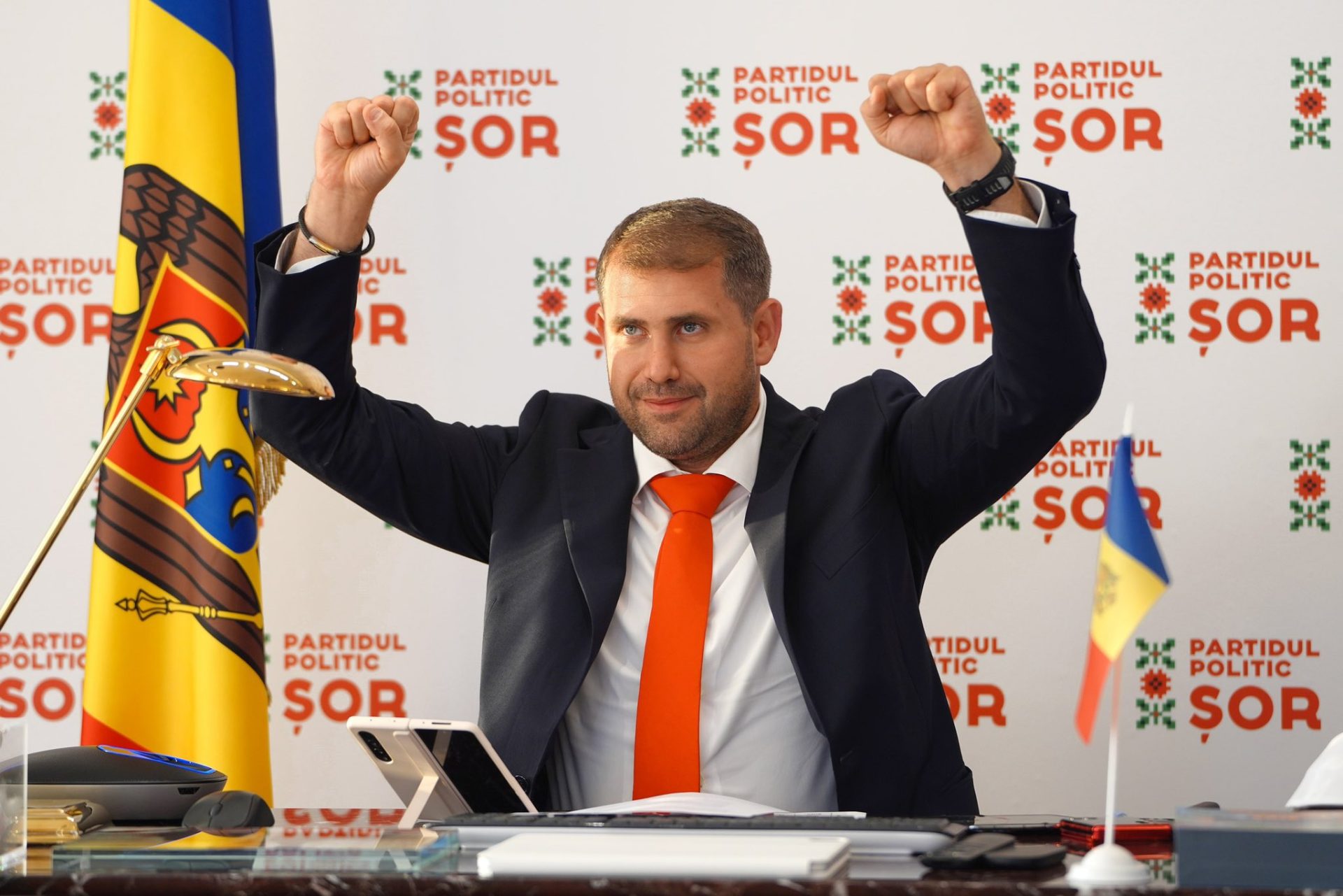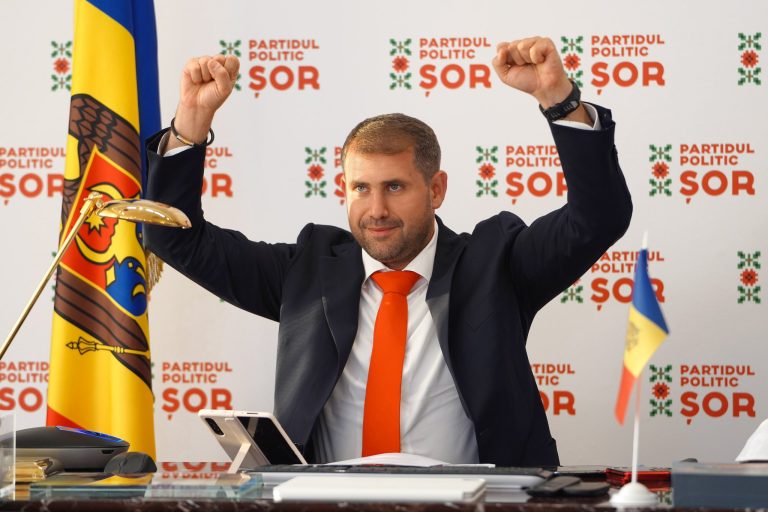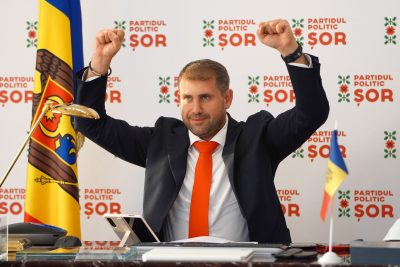Photo: @ilanshormoldova on X 2025-01-17
Photo: @ilanshormoldova on X 2025-01-17
According to a report by Moldova’s Intelligence and Security Service (SIS), Russia extensively interfered in the process of carrying out a critical referendum last October. Through this referendum, citizens were to decide whether to enshrine Moldova’s aspiration to join the European Union in the constitution. The intelligence report was presented to the parliament by SIS chief Alexandru Musteață în mid-December of last year. On the heels of revelations into meddling in elections in Romania, this report demonstrates that intelligence services are also aware of Russian influence operations in Moldova.
In Moldova’s case, the full scope of the operation reveals disinformation campaigns, illegal financing of pro-Russian political parties, the organization of violent protests, exploitation of the Orthodox Church, and cyberattacks on electoral infrastructure likely carried out by foreign actors.
Ilan Șor: The Oligarch Behind the Attempt to Destabilize Moldova
The October Moldovan referendum ended with a very narrow result: 50.3% of the voters expressed support. Immediately after the vote, acting Moldovan President Maia Sandu declared that “criminal groups… attacked our country with tens of millions of euros, lies, and propaganda, using the most shameful methods to keep our citizens and nation in uncertainty and instability.”
She then added that these groups were supported from abroad. The secret service’s report now provides a detailed description of what the entire operation was supposed to look like.
According to information from the SIS, Moldovan oligarch Ilan Șor played a key role in the attempted manipulation. The roots of his wealth go back to 2014, when he was involved in a large-scale banking fraud in which approximately $1 billion was stolen from three Moldovan banks—Banca de Economii, Unibank, and Banca Socială—the equivalent of about 10–12% of Moldova’s GDP at the time.
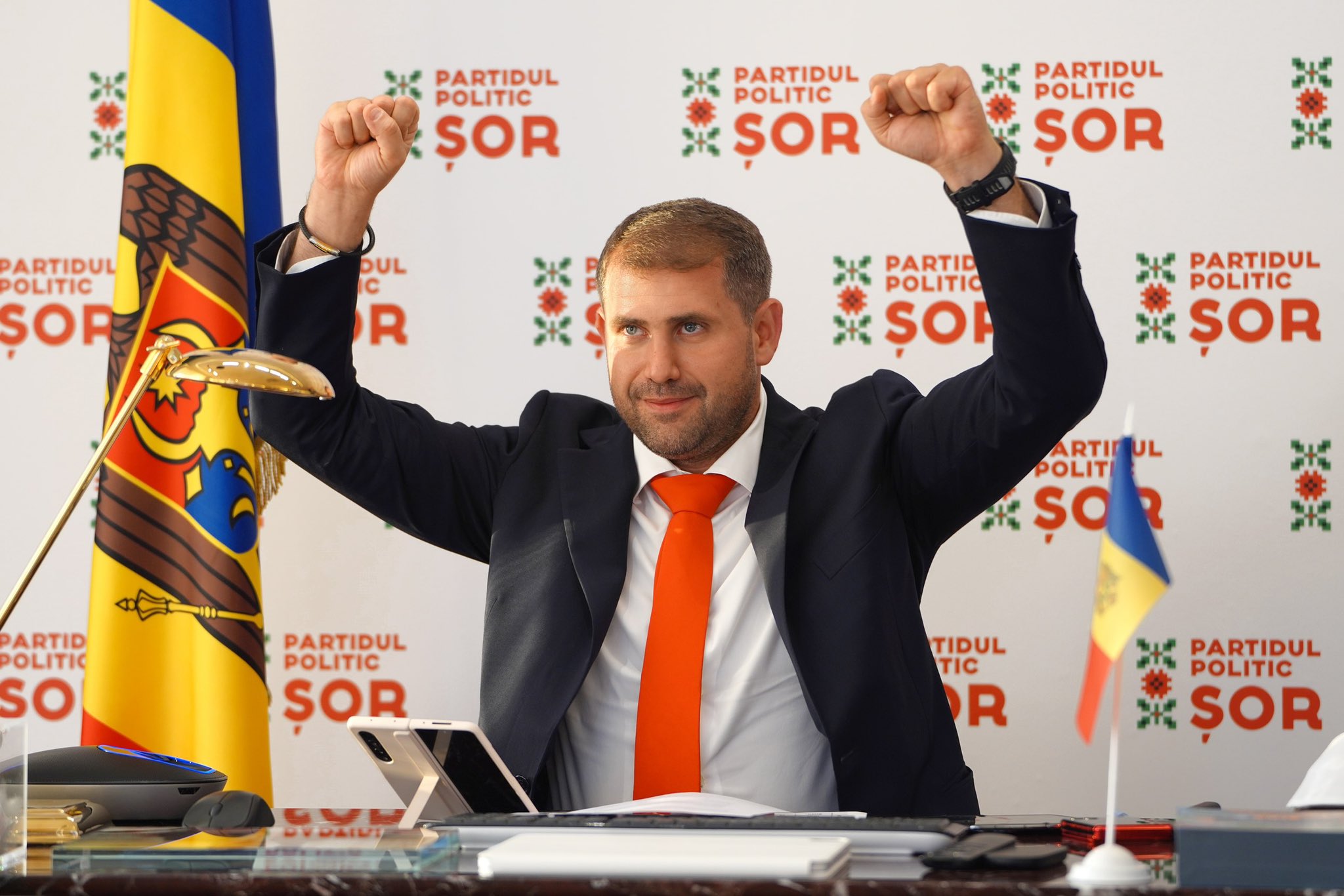
Ilan Șor. Source: @ilanshormoldova on X
For this fraud, Șor was sentenced in 2017 to seven and a half years in prison, but he appealed the verdict. In 2023, his sentence was increased to 15 years in prison. However, Șor never served his sentence, as he fled to Israel and later to Russia.
“ȘOR” Party: A Political Cover for Influence Operations
The trial and conviction did not stop Șor from taking over the political movement Equality and renaming it the “ȘOR” Party. Under this banner, he was elected to the Moldovan parliament in 2019. However, he never personally attended parliamentary sessions due to his criminal prosecution.
Moldova’s Constitutional Court banned Șor’s party in the summer of 2022, allowing its MPs to complete their terms as independents. However, this did not prevent Șor from further political engagement. In the spring of 2024, he moved from Israel to Russia, where, according to the intelligence service, he coordinated a large-scale operation aimed at interfering in Moldovan politics, particularly the referendum on the European Union. His newly established coordination center was reportedly directly protected and controlled by Russian intelligence — that is, the FSB.
According to reports by the Moldovan SIS, a coordination headquarters for the ȘOR project was created in Moscow with separate units responsible for political strategy, organization, finance, and logistics, all led by Ilan Șor himself. In Moldova’s capital, Chișinău, an executive office began operating. The Moldovan office was responsible for legal matters, public relations, youth coordination, logistics, and training for individuals speaking at election rallies.
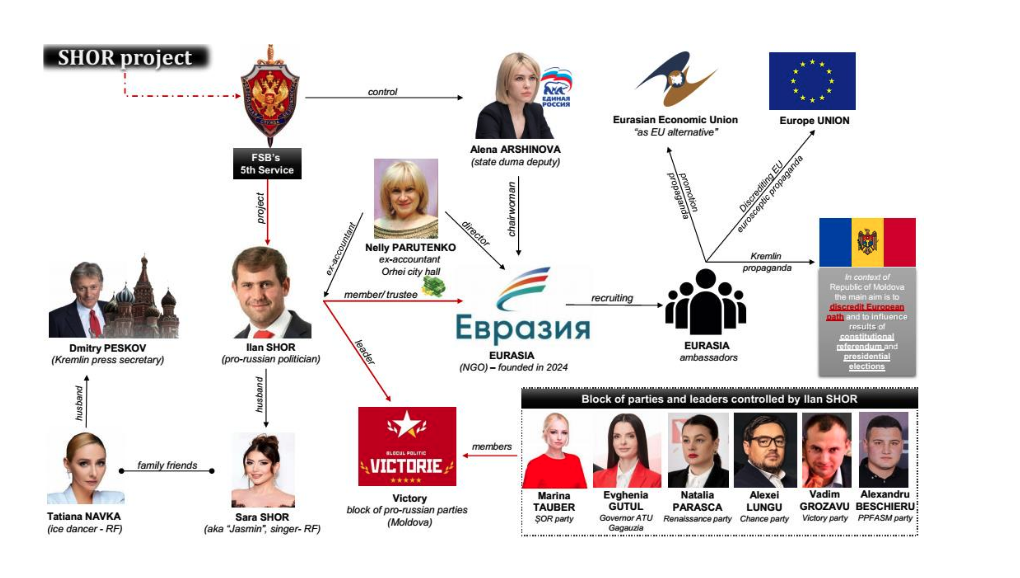
The scheme of the entire ȘOR project. | Source: Moldovan Intelligence and Security Service report
The office reportedly trained more than 100 “recruiters,” later distributed among 119 territorial cells. Each cell aimed to recruit at least 1,500 workers. Additionally, over 1,900 primary cells were created, training over 33,000 activists. Each activist was tasked with persuading five–ten voters, promising them money in exchange for voting against enshrining the aspiration to EU accession in the constitution. The organizers themselves were paid approximately MDL 2,000 (about €100) per month, increasing to MDL 3,000 (about €150) in October. However, according to Moldovan intelligence services, the recruiters ultimately gathered fewer bought votes than planned, securing votes from around 84,000 individuals.
Pobeda–Victorie: A New Pro-Russian Bloc and Its Strategy
A new political entity called Pobeda–Victorie was established as a cover for this operation. Founded by Șor, it included Șor’s banned party and several of Moldova’s smaller pro-Russian parties. Șor became the political leader of Pobeda, while the position of executive secretary was taken by Evghenia Guțul, a member of Șor’s banned party and the governor of the Gagauz Autonomous Territorial Unit. Gagauzia, like the better-known separatist region of Transnistria, is strongly pro-Russian. In a 2014 referendum, the residents of Gagauzia rejected Moldova’s EU accession and approved a potential declaration of independence if accession were to occur.
According to the SIS report, the newly created Pobeda bloc established three call centers in Moscow to maintain contact with Moldovan branches and recruit new supporters. Pobeda’s headquarters used a Telegram bot (@KYCMD_bot) for registering new promoters and coordinating their activities.
Evrazia: Propaganda and Organization of Destabilization Actions
However, Pobeda–Victorie was not the only organization connected to Șor established in April 2024. The second was the non-profit organization ANO Evrazia, founded by the former secretary of the “ȘOR” Party, Nelli Parutenco. She fled Moldova in 2022 due to an investigation into the illegal financing of the “ȘOR” Party.
The coordinating council of Evrazia is led by Aliona Arshinova, a deputy in the State Duma of the Russian Federation and a member of the United Russia party. Arshinova stated, among other things, that Evrazia “does everything to help President Vladimir Putin revive our great Eurasian family.” Another member of the coordinating council was Ilan Șor himself. According to journalists’ finding from our partner organization OCCRP, as well as the Moldovan intelligence service, Evrazia played a key role in Russia’s plan to sabotage the referendum.
Evrazia’s activities, according to the content of the SIS report, can be divided into two parts. Outwardly, it presented and continues to present itself as a non-profit organization with the aim of “strengthening mutually beneficial integration processes in the post-Soviet space.” On its website, one can find a variety of projects focused on cultural exchange, humanitarian aid, and the development of cooperation among post-Soviet countries.
However, this is only part of its activities. Evrazia is also a tool for spreading anti-Western and pro-Russian propaganda. The Moldovan intelligence service report states that it promotes the concept of the so-called “Russian world” (russkij mir). Furthermore, it accuses Evrazia of additional activities, such as recruiting Moldovan youth by organizing visits to Russia as part of various programs; identifying and attracting individuals prone to destabilizing actions; circumventing international sanctions through intermediary organizations; and creating a platform for the illegal financing of political parties.
Training Protesters: Tactics for Confrontations with Police
Beyond these activities, Moldovan authorities accuse Evrazia of even more serious actions. The SIS report states: “Between June 19–24, 2024, 115 young people from the Republic of Moldova were sent under the auspices of the so-called ‘Victorie Bloc’ (under the guise of Evrazia projects) to Moscow for training in methods and techniques for organizing and conducting protests.”
According to the SIS, the training included tactics for provoking the police and “intelligent” confrontations with police cordons. It also covered methods for physical clashes with law enforcement, the use of pyrotechnic devices and smoke bombs, throwing objects such as stones, eggs, and lime bags at the police, freeing detained accomplices, protecting protest leaders, and neutralizing plainclothes officers by accusing them of being “provocateurs.”
The SIS report mentions that some trainers were members of the youth organization “Young Guard of United Russia.” According to the SIS, some of the trained Moldovans participated in specific acts of vandalism, such as defacing the buildings of Teleradio Moldova, the Supreme Court, the headquarters of the Central Election Commission (CEC), and the Ministry of Labor with lime. Two individuals arrested for defacing the entrance to the Moldovan government building claimed they were paid €5,000 (roughly 100,000 MDL) for the act.
The SIS also claims that some of the young people were selected for advanced training in guerrilla camps in Bosnia and Herzegovina, where they were trained as provocateurs to organize protests and engage in violent actions. Their training reportedly included drone operations, mass psychology during protests, tactics for penetrating police cordons, recruitment psychology, identifying surveillance, preparing incendiary devices, and conducting exercises in real urban environments.
The Orthodox Church as a Tool of Pro-Russian Politics
Evrazia also served as a platform for engaging the Moldovan Orthodox Church. Russia organized religious pilgrimages to Moscow, where Orthodox clergy were persuaded to support pro-Russian and anti-European positions and to actively participate in influencing presidential elections and the referendum.
According to the SIS, upon arriving in Moscow, priests were offered contracts with the Evrazia organization and issued bank cards from the Russian payment system “Mir.” These cards were used to receive financial support from the Russian Patriarchate. Upon returning to Moldova, the clergy were promised a reward of $1,000 (~20,000 MDL) per person. These financial incentives were intended to motivate the clergy to actively support pro-Russian objectives.
Consolidation of the Moldovan Diaspora in Russia
In addition to these activities, Russia established several seemingly independent Moldovan organizations within its territory as part of its influence operations. A key role was played by the Moldovan Cultural-Educational Center, founded in December 2023, which officially presents itself as an institution promoting Moldovan culture and national values.
However, according to the SIS report, the center actually serves to consolidate the Moldovan diaspora around Șor’s group and to manipulate elections. This was evident during the October 2024 presidential elections when the center attracted Moldovan voters in Moscow with free vouchers to a café near the polling station on Neglinnaya Street. At the same time, it offered them the so-called Citizen Card of the Republic of Moldova in the Russian Federation and promised high wages of up to 150,000 rubles (~30,000 MDL, or ~€1,500) for cooperation. The center is also linked to three Moscow-based call centers coordinating activity in Moldova and among the diaspora.
How to Pay for Influence: Grants, Cryptocurrencies, and Evading Sanctions
To fund the entire campaign, a variety of methods were used by the Russian project, ranging from grants and donations to cash payments and cryptocurrency transactions. Couriers were involved in transporting cash by air.
Even the sanctioned Promsvyazbank participated in financial transfers through the Russian Mir payment system and other platforms in Uzbekistan and Central Asia. Peer-to-peer payment systems like “Zolotaya Korona” were also utilized, along with cryptocurrency platforms such as BINANCE and BYBIT. According to the SIS, Russian intelligence services also used the TRUSTEE app, which enables cryptocurrency payments via virtual Visa/Mastercard systems for smartphones.
Russia’s efforts to influence Moldovan campaigns were further supported by social media campaigns on TikTok, Facebook, and VKontakte. Șor’s movement reportedly spent €140,000 on paid Facebook advertisements.
The SIS also reports that election interference and undermining of the voting process continued even on the day of the referendum, both in cyberspace with DDoS attacks on government websites and in the physical realm with bomb threat hoaxes at polling stations abroad (where the diaspora voted.)
Russia Accelerates: From 2021 Plans to Present-Day Reality
Moldova has been a focus of Russian interest for years. In 2023, VSquare and partners uncovered leaked strategic plans from 2021 outlining Russia’s intent to dominate Moldovan politics. These plans included creating a network of NGOs and political organizations to neutralize Moldova’s pro-Western ambitions.
Even back then, the core strategy involved supporting pro-Russian politicians, leveraging the Orthodox Church, establishing pro-Russian NGOs, opposing EU and NATO integration, and destabilizing society through unrest. The current SIS report shows that Russia has already implemented these plans in Moldova.
While the 2021 document envisioned gradual destabilization, to be carried out in the decade leading up to2030, reality reveals that Russia significantly accelerated its activities in response to Moldova’s EU referendum.
The Czech version of this story was published on investigace.cz.
Subscribe to Goulash, our original VSquare newsletter that delivers the best investigative journalism from Central Europe straight to your inbox!
Josef Šlerka has worked as a data analyst and reporter at Czech Centre for Investigative Journalism since 2021. He used to head the Czech Fund for Independent Journalism (NFNZ). He is also the head of the Department of New Media Studies at Charles University in Prague.

